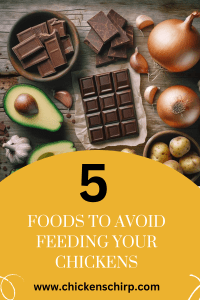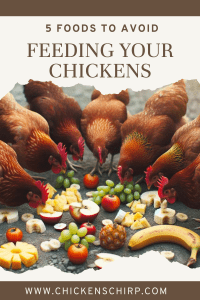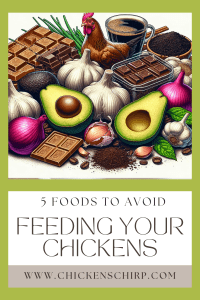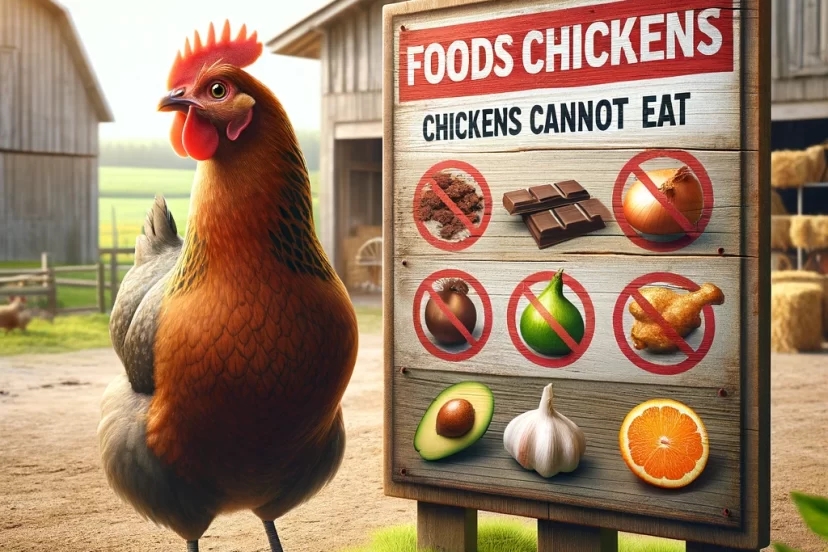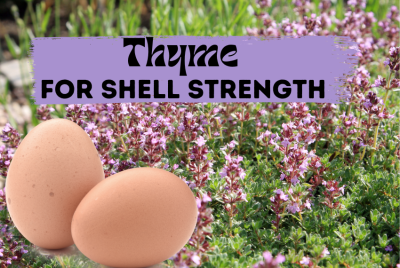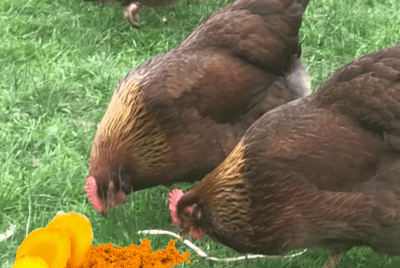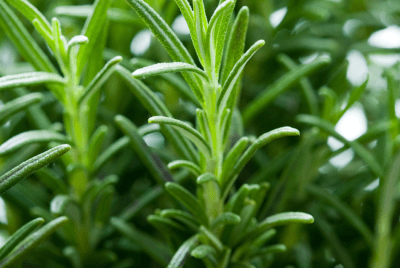What Foods Chickens Cannot Eat
What Foods Chickens Cannot Eat
1. Introduction: The Importance of ‘What Foods Chickens Cannot Eat’
As a seasoned chicken keeper, I can’t stress enough the importance of understanding what to feed your chickens and also what foods chickens cannot eat. Just like us, chickens need a balanced diet, but there are certain foods that can be harmful to them. Here is a quirky picture about a serious matter.
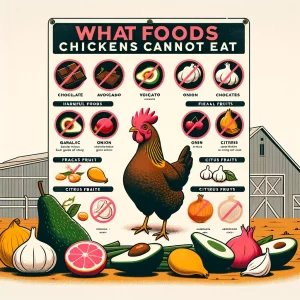
2. Understanding Chicken Digestion
2.1. Unique Aspects of Chicken Digestion:
Chickens have a fascinating digestive system that’s distinctively different from ours. To start with, they don’t have teeth. Instead, they use their beaks to peck and pick up food, which they swallow whole. This is where the ‘crop’ comes into play. The crop is an enlarged part of the esophagus that acts as a storage pouch, allowing chickens to eat quickly and digest later. This adaptation is particularly useful, as it lets chickens forage efficiently while keeping an eye out for predators.
Once the food leaves the crop, it enters the gizzard. Unlike human stomachs, the gizzard is a powerful muscle that grinds food. Chickens ingest small stones and grit, which are stored in the gizzard to aid in this grinding process. This mechanical digestion is crucial as it compensates for the absence of teeth.
Another intriguing aspect is how chickens handle absorption and waste. Their small intestines function similarly to ours, where most of the nutrients are absorbed. But, unlike mammals, chickens have a combined exit for digestive and urinary waste, called the cloaca. This organ also plays a role in reproduction.
Finally, chickens have a relatively quick digestive process. The time from eating to excretion can be as little as a few hours, depending on the food type. This efficiency is vital for their high metabolism and the energy needs of laying hens.
Understanding these unique aspects of chicken digestion is key to providing them with the right diet. Their digestive system is designed to handle certain types of food, and knowing this helps in avoiding foods that could harm them.
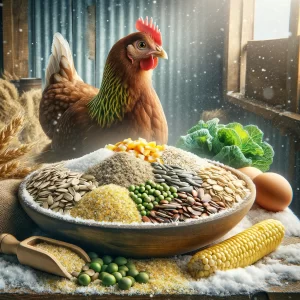
2.2. Common Misconceptions About What Chickens Can Eat:
There’s a widespread belief that chickens are the garbage disposals of the farmyard, able to consume almost anything we throw their way. However, this isn’t entirely accurate and can be dangerous. One of the most common misconceptions is that chickens can safely eat all kitchen scraps. While they can eat many scraps like vegetable peels and fruit, others like processed foods, salty snacks, or anything moldy are harmful.
Another misconception is regarding the size of the food. People often assume that chickens can manage large pieces of food because they peck at their feed. However, large chunks, especially of hard foods, can cause choking or impact the crop, leading to serious health issues.
Some believe that chickens can eat any plant or grain. While they are omnivores and enjoy a variety of grains and greens, certain plants like nightshade vegetables in their raw form are toxic to them. Similarly, uncooked beans contain hemagglutinin, which can be toxic to chickens.
Additionally, the idea that chickens can live on kitchen scraps alone is misleading. Chickens require a balanced diet, which includes a commercial chicken feed that’s formulated to meet their nutritional needs, especially for laying hens.
Debunking these misconceptions is crucial for the health and wellbeing of chickens. It ensures that they are not only fed safely but also receive the necessary nutrition for a healthy life.
3. Foods to Avoid Feeding Your Chickens
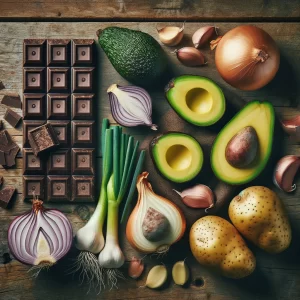
3.1. Toxic Foods for Chickens:
When it comes to feeding chickens, it’s essential to be aware of certain foods that are toxic and can cause serious health issues. One of the most dangerous is avocado. All parts of the avocado, especially the pit and skin, contain persin, a fungicidal toxin that can cause heart damage and even death in chickens.
Another harmful food is chocolate, which contains theobromine and caffeine. These substances can affect the chicken’s heart and nervous system, leading to potential fatalities. Similarly, caffeine, found in coffee grounds and tea bags, should never be given to chickens due to its stimulant properties, which can be harmful to their cardiovascular system.
Onions and garlic, in large quantities, can be toxic as well. They contain thiosulfate, which can cause hemolytic anemia by rupturing red blood cells. While small amounts might not be harmful, it’s best to avoid feeding them in large quantities.
Uncooked beans pose a significant risk due to the presence of a natural toxin called hemagglutinin, which can be fatal to chickens. Beans must be properly cooked to neutralize this toxin before they can be safely fed to chickens.
Certain types of fruit pits and seeds, like those from apples, cherries, peaches, and apricots, contain cyanide compounds, which can be toxic if consumed in large quantities. It’s safer to remove these pits and seeds before offering the fruits to your chickens.
Also, salty foods can lead to salt poisoning, which manifests as increased thirst, diarrhea, and can be fatal in severe cases. Chickens are not equipped to process large amounts of salt, making it important to keep salty snacks out of their diet.
Lastly, moldy or rotten foods can contain toxins and harmful bacteria, leading to health problems like respiratory issues and fungal infections. Always ensure that any food given to chickens is fresh and free from mold.
Being aware of these toxic foods and avoiding them in your chickens’ diet is essential for maintaining their health and wellbeing.
3.2. Unhealthy Human Foods:
While chickens can be surprisingly versatile eaters, certain human foods are unhealthy for them and should be avoided. Processed foods, which are often high in salt and preservatives, can be detrimental to a chicken’s health. Excessive salt intake, for instance, can lead to salt toxicity, causing dehydration, kidney damage, and even death. Foods like chips, crackers, and canned goods, which are typically high in sodium, are not suitable for chickens.
Sugary foods, such as candies, chocolate, and baked goods, should also be off the menu. Chickens don’t process sugar well, and high sugar intake can lead to obesity, which in turn can cause a myriad of health issues, including fatty liver disease and decreased egg production. Moreover, chocolate contains theobromine, which is toxic to chickens, as mentioned earlier.
Another category to avoid is fried and fatty foods. Chickens need a diet low in fat and high in protein. Feeding them greasy foods like fried chicken (which is also ethically questionable) or fast food can lead to obesity and associated health problems.
Dairy products are also a no-go. Chickens lack significant amounts of lactase, the enzyme required to break down lactose in dairy products. Feeding them milk, cheese, or yogurt can result in digestive upset.
Lastly, alcohol and fermented food products should never be given to chickens. Their bodies are not equipped to process alcohol, and even small amounts can be harmful.
Feeding chickens a diet similar to their natural diet, rich in grains, insects, and greens, while avoiding unhealthy human foods, is key to their health and longevity.
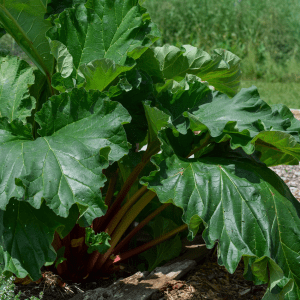
3.3. Hazardous Plant Materials:
In addition to certain human foods, there are various plant materials that can be hazardous to chickens and should be avoided. One common garden plant that poses a risk is the nightshade family, which includes tomatoes, potatoes, and eggplants. While the ripe fruit of tomatoes is generally safe, the leaves, stems, and green parts contain solanine, a toxin that can be harmful to chickens. Similarly, green potatoes and potato leaves also contain solanine and should not be fed to chickens.
Another plant to be cautious of is rhubarb. The leaves of rhubarb contain oxalic acid, which can cause poisoning in chickens, leading to weakness, difficulty breathing, and even death. Only the stalks are safe, but they should be offered in moderation due to their acidic nature.
Foxglove is another dangerous plant, as it contains digitalis, a compound that can affect the heart. Consumption of foxglove by chickens can lead to cardiac arrest and death.
Plants like azaleas, oleander, and castor beans are also toxic. They contain compounds that can cause severe digestive upset, heart problems, and in some cases, death.
Additionally, certain ornamental plants and bulbs, such as lilies, daffodils, and tulips, can be toxic if ingested by chickens. These plants can cause gastrointestinal irritation, lethargy, and more serious health issues.
It’s crucial to be aware of the plants in and around the area where chickens are kept and to ensure that they don’t have access to these and other toxic plants. A safe practice is to remove any potentially harmful plants from their range or securely fence off areas with such vegetation.
4. The Risks of Feeding Chickens the Wrong Foods
4.1. Short-term Health Issues:
Feeding chickens inappropriate foods can lead to a variety of short-term health issues that, while often reversible, can cause significant discomfort and stress to the birds. One of the immediate risks is digestive upset. Chickens have a sensitive digestive system, and foods like onions, garlic, or large quantities of citrus can disrupt their gut health, leading to diarrhea, dehydration, or constipation.
Another concern is the risk of toxicity from foods like chocolate, caffeine, or avocado. These substances can lead to symptoms like increased heart rate, lethargy, and in severe cases, seizures or death. Even foods that are not toxic but are inappropriate, like sugary or salty snacks, can cause immediate health problems such as increased thirst, salt toxicity, and bloating.
Choking hazards also pose a significant short-term risk. Chickens tend to swallow food whole, and large or hard pieces of food, like whole corn kernels or large chunks of raw carrot, can get stuck in their throat or crop, leading to choking or crop impaction.
In addition, moldy or spoiled food can lead to respiratory problems or fungal infections. Chickens are susceptible to airborne spores from moldy feed, which can cause respiratory distress, coughing, and sneezing.
Lastly, a sudden change in diet can also cause stress to chickens, leading to a temporary drop in egg production or a change in egg quality. Chickens thrive on routine and consistency, and abrupt dietary changes can upset this balance.
Addressing these short-term health issues promptly is crucial to prevent them from developing into more serious, long-term problems. Ensuring a consistent, balanced, and appropriate diet is key to maintaining the health and happiness of your chickens.
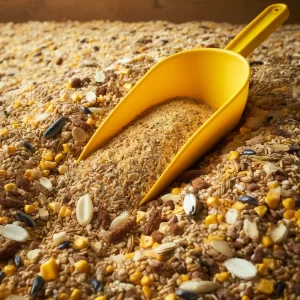
4.2. Long-term Health Complications:
Feeding chickens inappropriate foods not only poses short-term health risks but can also lead to serious long-term health complications. One of the most significant concerns is obesity. Chickens fed a diet high in fats and sugars, especially from processed human foods, can become overweight. This excess weight puts strain on their organs and can lead to fatty liver disease, a serious condition that can be fatal.
Another long-term issue is the development of nutritional deficiencies. Chickens require a well-balanced diet to maintain their health, including specific vitamins and minerals. A diet heavy in scraps and lacking in complete poultry feed can lead to deficiencies that affect bone health, feather quality, and overall vitality. For instance, a lack of calcium can lead to weak eggshells and poor bone development.
Chronic exposure to toxic substances found in foods like avocados or chocolate can have cumulative effects on a chicken’s health. These toxins can cause ongoing damage to the heart and nervous system, leading to decreased life expectancy and quality of life.
Repeated exposure to moldy or spoiled food can also cause respiratory and digestive system damage over time. This can result in chronic respiratory issues or a weakened immune system, making chickens more susceptible to infections and diseases.
Furthermore, long-term feeding of inappropriate foods can lead to behavioral changes. Chickens may become picky eaters, refusing their regular, nutritious feed in favor of less healthy scraps. This change in eating habits can further exacerbate health problems and disrupt the social dynamics within the flock.
In summary, the long-term health of chickens is heavily influenced by their diet. Consistently providing a diet that is not only safe but also nutritionally complete is essential for preventing these serious long-term health complications.
5. Safe and Healthy Alternatives to What Foods Chickens Cannot Eat
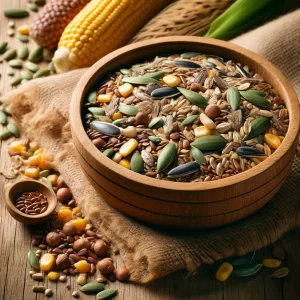
5.1. Nutrient-Rich Foods for Chickens:
To balance the svales you need to learn what foods chickens cannot eat and what foods they can eat. Ensuring chickens have access to a variety of nutrient-rich foods is crucial for their health and wellbeing. A well-rounded diet for chickens should include a combination of grains, proteins, vegetables, and occasional fruits.
Grains: Grains are a staple in a chicken’s diet. Options like corn, wheat, barley, and oats provide essential carbohydrates and some protein. These can be given in their whole form or as part of a balanced commercial chicken feed, which is formulated to meet all their nutritional needs.
Proteins: Protein is vital for chickens, especially for those laying eggs. Animal-based proteins like mealworms, earthworms, or small amounts of cooked meat (avoiding processed meats) are excellent choices. For plant-based protein, cooked beans (never raw), peas, and lentils can be given.
Vegetables: Leafy greens like kale, spinach, and lettuce are great for chickens. They are high in vitamins and minerals and can be easily grown in a garden or bought fresh. Other vegetables like squash, cucumbers, and carrots (chopped or grated) are also beneficial and provide hydration as well as nutrition.
Fruits: While fruits should be given in moderation due to their sugar content, they are a good source of vitamins. Apples (without seeds), berries, and melons are excellent choices. Ensure to remove any pits or seeds from fruits like cherries or peaches before feeding them to chickens.
Calcium Sources: For laying hens, calcium is crucial for strong eggshells. Crushed oyster shells or specially formulated calcium supplements can be provided to meet this need.
Greens and Herbs: Herbs like parsley, oregano, and mint can be beneficial for chickens, offering not just nutritional benefits but also aiding in digestive health and acting as natural worming agents.
Providing a diet that includes these nutrient-rich foods, in conjunction with a high-quality commercial feed, ensures that chickens get a balance of all the necessary nutrients. This not only promotes their physical health but also supports their natural behaviors like foraging and pecking, contributing to their overall wellbeing.
6. Best Practices in Chicken Feeding and What Foods Chickens Cannot Eat
Discover what foods to avoid feeding your chickens to ensure their health and safety. Learn about harmful foods and proper nutrition.”
6.1. Balancing the Diet:
A balanced diet for chickens includes a mix of commercial feed, grains, vegetables, and occasional treats. Understanding Portion Control: It’s crucial to avoid overfeeding and to ensure that the chickens have a balanced diet.
7. Conclusion: What Foods Chickens Cannot Eat, Fostering good habits
In conclusion, being mindful of what we feed our chickens is as important as caring for any other pet. By understanding their dietary needs and restrictions, we can ensure their health and happiness.
FAQs on What Foods Chickens Cannot Eat
Can chickens eat leftovers from our meals?
Chickens can eat leftovers from meals, but avoid giving them anything salty, spicy, or containing harmful foods like avocado, chocolate, or onions.
How often should I give treats to my chickens?
Treats should be given to chickens sparingly, making up no more than 10% of their overall diet.
What are the best sources of protein for chickens?
Excellent sources of protein for chickens include mealworms, cooked eggs, and small amounts of lean meat.
Is it safe to feed chickens kitchen scraps?
Feeding chickens kitchen scraps is generally safe, but avoid toxic foods and ensure the scraps are part of a varied, balanced diet.
How can I tell if my chickens are getting a balanced diet?
To determine if your chickens are getting a balanced diet, look for signs of good health such as active behavior, shiny feathers, and consistent egg production.
Other Articles You Might Find Interesting:
Power herbs for chickens – Unlocking their best health.
CHicken Tractors for your flock
Beneficial Herbs For Your Flock
